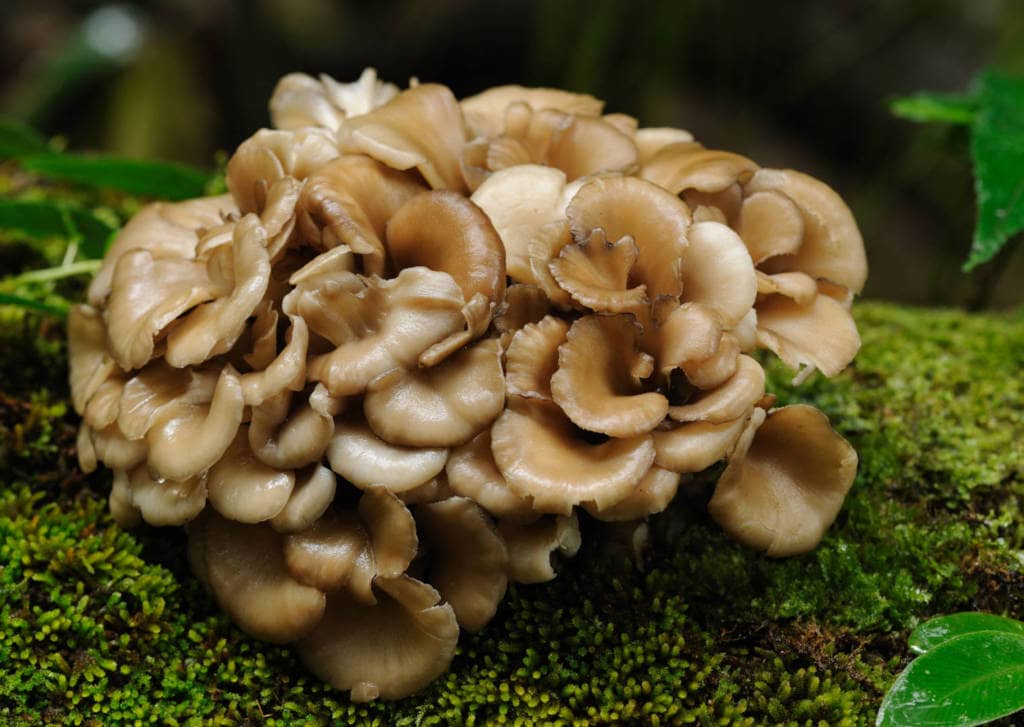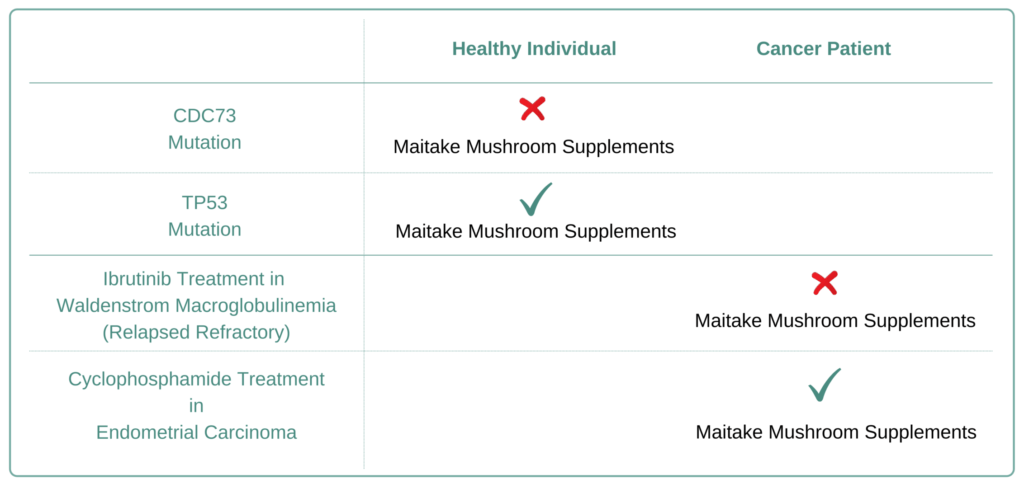Highlights
Nutritional supplements like Maitake Mushroom have many health benefits and are being widely used by cancer patients and those at-genetic-risk of cancer. But, is it safe to take Maitake Mushroom supplements for all types of cancer and without considering any ongoing treatments and other lifestyle conditions? A common belief but only a myth is that anything natural can only benefit me or do no harm. As one example, the use of grapefruit with certain medications is not recommended. Another example, the use of spinach with some blood thinning medications can cause adverse interactions and should be avoided. For cancer, nutrition which includes the food and natural supplements has been shown to influence outcomes. Hence a frequently asked question by cancer patients to dieticians and doctors is “What Should I eat and What Should I Avoid?”.
Taking nutritional Maitake Mushroom supplements can benefit cancer patients with Endometrial Carcinoma on Cyclophosphamide treatment. But avoid Maitake Mushroom supplements if on Ibrutinib treatment for Waldenstrom Macroglobulinemia (Relapsed Refractory). Similarly, taking nutritional supplement Maitake Mushroom can benefit healthy individuals who are at genetic risk of cancer due to mutation of gene TP53. But avoid taking nutritional supplement Maitake Mushroom when at genetic risk of cancer due to mutation of gene CDC73.
The takeaway being – your individual context will influence your decision if nutritional supplement Maitake Mushroom is safe or not. And also that this decision needs to be constantly revisited as conditions change. Conditions like cancer type, current ongoing treatments and supplements, age, gender, weight, height, lifestyle and any genetic mutations identified matter. So a legitimate question for you to ask for any recommendation of food and natural supplement is how it is related to your individual context.
Brief Overview
Nutritional supplements – vitamins, herbs, minerals, probiotics, and other specialty categories are increasing. Supplements are high concentrations of active ingredients which are also found in different foods. The difference being foods contain more than one active ingredient at lower diffused concentrations. Remember that each of these ingredients has its own science and biological mechanism at the molecular level – hence choose the right combination of supplements like Maitake Mushroom based on individual context and conditions.

So the question is should you take the supplement Maitake Mushroom? Should you take it when at genetic risk of cancer for mutation of gene CDC73? Should you take it when at genetic risk of cancer for mutation of gene TP53? Should you take it when diagnosed with Waldenstrom Macroglobulinemia (Relapsed Refractory)? Should you take Maitake Mushroom supplement when diagnosed with Endometrial Carcinoma? Should you take it when on Ibrutinib treatment? Should you continue taking Maitake Mushroom supplement if you change your treatment from Ibrutinib to Cyclophosphamide? So a general explanation like – it is natural or it increases immunity may not be acceptable and sufficient for choosing Maitake Mushroom.
Cancer
Cancer remains an unsolved problem statement. The improved availability of personalized treatments and monitoring of cancer via blood and saliva have been significant factors to improve outcomes. The earlier the intervention – the better the influence on outcome. Genetic testing has the potential to assess cancer risk and susceptibility early. But besides regular monitoring in most cases there are no therapeutic intervention options available. After diagnosis with cancer such as Waldenstrom Macroglobulinemia (Relapsed Refractory) or Endometrial Carcinoma, the treatments get personalized to tumor genomics and factors like staging of disease, age and gender. During cancer remission (after treatment cycle is complete) – monitoring is used for assessment of any relapse and accordingly decide next steps. A large majority of cancer patients and those at-risk do take nutritional supplements like Maitake Mushroom.
So the question is that are all genetic mutation risks and types of cancers to be considered as one when deciding the use of Maitake Mushroom? Are the biochemical pathway implications of genetic risk for cancer due to mutation of gene CDC73 the same as due to mutation of gene TP53? Are the implications of taking Maitake Mushroom supplement in Waldenstrom Macroglobulinemia (Relapsed Refractory) the same as Endometrial Carcinoma? Is it one and the same if you are on treatment Ibrutinib or on Cyclophosphamide?
Maitake Mushroom – A Nutritional Supplement
Maitake mushroom also known as Grifola frondosa is a medicinal mushroom found commonly in Japan, China, and North America. In Japanese, Maitake means “dancing mushroom”. It is cooked and consumed in the form of food and is also available in the form of dietary supplements. Following are some of the purported uses of Maitake Mushrooms:
- May stimulate the immune response (Vaclav Vetvicka and Jana Vetvickova, Ann Transl Med., 2014)
- May help reduce cholesterol (Mayumi Sato et al, J Oleo Sci., 2013)
- May lower blood pressure (Nadeem A Talpur et al, Mol Cell Biochem., 2002)
- May help manage diabetes (Ya-Hui Chen et al, Int J Med Mushrooms., 2015)
- May improve metabolic health (Nadeem A Talpur et al, Mol Cell Biochem., 2002)
- May induce ovulation (Jui-Tung Chen et al, J Altern Complement Med., 2010)
Maitake Mushroom supplements contain many active ingredients including GFP-A (the polysaccharide isolated from G. frondosa), D-fraction and Grifola frondosa Glycoprotein GFG-3a at different concentration levels. The molecular pathways which are regulated by Maitake Mushroom include C-type Lectin Receptor Signaling, Epithelial to Mesenchymal Transition, WNT Beta Catenin Signaling, P53 Signaling and NFKB Signaling. These cellular pathways directly or indirectly regulate specific cancer molecular endpoints like growth, spread and death. Because of this biological regulation – for cancer nutrition, the right choice of supplements like Maitake Mushroom individually or in combination is an important decision to be made. When making decisions on the use of supplement Maitake Mushroom for cancer – do consider all these factors and explanations. Because just as true for cancer treatments – Maitake Mushroom use cannot be a one-size-fits-all decision for all types of cancers.
Choosing Maitake Mushroom Supplements for Your Cancer
The reason there is no easy way to answer the question “When should I avoid Maitake Mushroom for Cancer” is because “It Depends!”. Just like the same treatment does not work for every cancer patient, based on your individual context the Maitake Mushroom may be harmful or safe. Along with which cancer and associated genetics – the ongoing treatments, supplements, lifestyle habits, BMI and allergies are all factors deciding if Maitake Mushroom should be avoided or not and why.
1. Will Maitake Mushroom Supplements benefit Cancer Patients with Waldenstrom Macroglobulinemia (Relapsed Refractory) undergoing Ibrutinib treatment?
Waldenstrom Macroglobulinemia (Relapsed Refractory) is characterized and driven by specific genetic mutations like BTK and TBL1XR1 leading to biochemical pathway changes in C-type Lectin Receptor Signaling, NFKB Signaling, B Cell Receptor Signaling and Phospholipase Signaling. A cancer treatment like Ibrutinib works through a specific pathway mechanism of action. The goal is to have a good overlap between the treatment and cancer driving pathways for a personalized approach which is effective. In such a condition any food or nutritional supplement which has a contrary effect to the treatment or reduces the overlap should be avoided. As an example, Maitake Mushroom should be avoided for Waldenstrom Macroglobulinemia (Relapsed Refractory) along with treatment Ibrutinib. Maitake Mushroom impacts pathways/processes like C-type Lectin Receptor Signaling which either promote drivers of the disease and/or nullify the treatment effect. Some of the factors which should be considered when choosing nutrition are type of cancer, treatments and supplements being taken currently (if any), age, gender, BMI, lifestyle and any genetic mutation information (if available).
2. Will Maitake Mushroom Supplements benefit Cancer Patients with Endometrial Carcinoma undergoing Cyclophosphamide Treatment?
Endometrial Carcinoma is characterized and driven by specific genetic mutations like PTEN and PIK3CA leading to biochemical pathway changes in Epithelial to Mesenchymal Transition, Hypoxia, P53 Signaling, PI3K-AKT-MTOR Signaling and Small Molecule Transport. A cancer treatment like Cyclophosphamide works through specific pathway mechanisms. The goal is to have a good overlap between the treatment and cancer driving pathways for a personalized approach. In such a condition any food or nutritional supplement which has a compatible effect to the treatment or reduces the overlap should be considered. As an example, Maitake Mushroom supplement should be considered for Endometrial Carcinoma along with treatment Cyclophosphamide. Maitake Mushroom supplement impacts pathways/processes like Epithelial to Mesenchymal Transition and Hypoxia which either obstruct drivers of Endometrial Carcinoma and/or improve Cyclophosphamide treatment effect.
3. Are Maitake Mushroom Supplements Safe for Healthy Individuals with CDC73 Mutation Associated Genetic Risk?
Different companies offer panels of genes to be tested for assessing genetic risk to different cancers. These panels cover genes associated with cancers of the breast, ovary, uterus, prostate, and gastrointestinal system and others. Genetic testing of these genes may confirm a diagnosis and help guide treatment and management decisions. Identification of a disease-causing variant may also guide testing and diagnosis of at-risk relatives. CDC73 is one of the genes generally available in panels for cancer risk testing.
CDC73 mutation causes biochemical pathways/processes like WNT Beta Catenin Signaling, Stem Cell Signaling and Angiogenesis to get impacted. These pathways are direct or indirect drivers of cancer molecular endpoints. Maitake Mushroom should be avoided when the genetic panel identifies the mutation of CDC73 for Neuroendocrine Cancer. Maitake Mushroom impacts pathways/processes like WNT Beta Catenin Signaling and Stem Cell Signaling and creates adverse effects with CDC73 and related conditions.
4. Are Maitake Mushroom Supplements Safe for Healthy Individuals with TP53 Mutation Associated Genetic Risk?
TP53 is one of the genes available in panels for cancer risk testing. TP53 mutation causes biochemical pathways/processes like P53 Signaling, Estrogen Signaling, Stem Cell Signaling, Autophagy and MAPK Signaling to get impacted. These pathways are direct or indirect drivers of cancer molecular endpoints. Consider taking Maitake Mushroom supplements when the genetic panel identifies mutation in TP53 for Breast Cancer and Lung Cancer. Maitake Mushroom impacts pathways/processes like P53 Signaling and Estrogen Signaling and creates a supportive effect in those with TP53 mutation and related conditions.

* Other Factors are also included like BMI, Treatments, Lifestyle Habits
In Conclusion
The two most important things to remember are that cancer treatments and nutrition are never the same for everyone. Nutrition, which includes food and nutritional supplements like Maitake Mushroom, is an effective tool which can be controlled by you, while facing cancer.
What food you eat and which supplements you take is a decision you make. Your decision should include consideration of the cancer gene mutations, which cancer, ongoing treatments and supplements, any allergies, lifestyle information, weight, height and habits.
The nutrition planning for cancer from addon is not based on internet searches. It automates the decision making for you based on molecular science implemented by our scientists and software engineers. Irrespective of whether you care to understand the underlying biochemical molecular pathways or not – for nutrition planning for cancer that understanding is needed.
Get started NOW with your nutrition planning by answering questions on the name of cancer, genetic mutations, ongoing treatments and supplements, any allergies, habits, lifestyle, age group and gender.